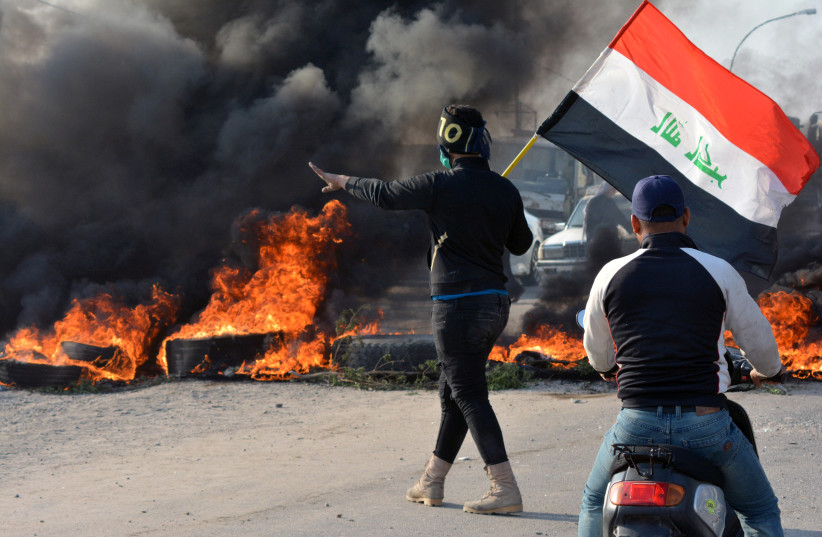Supporters of Shi'ite cleric Moqtada al-Sadr withdrew on Tuesday from Baghdad’s Green Zone, the scene of violent clashes that began the previous day after he announced that he would retire from politics permanently.
For more stories from The Media Line go to themedialine.org
Moments later, the Iraqi army lifted the nationwide curfew imposed as a result of the riots.
In a brief televised speech on Tuesday, Sadr ordered his followers to cease the violent protests and immediately leave the area.
“I apologize to the Iraqi people, who are the only ones affected by what happened. Recent events have made Iraq a prisoner of corruption and violence. Now I criticize the revolution of the Sadrist Movement as I criticized the October Revolution,” he said, in a reference to the October Protest Movement, also known in Iraq as the Tishreen Movement, which began in October 2019 and led to the resignation of the government of then-Prime Minister Adil Abdul-Mahdi.
“I thank the security forces that stood neutral with all parties. The Popular Mobilization Forces [a state-sponsored umbrella organization of some 67 armed factions, with around 128,000 fighters, mostly Shi'ites] has nothing to do with what is happening. The party [the Sadrist Movement] is disciplined and obedient, and I wash my hands of those who do not withdraw from the parliament building within an hour,” he said.

Deadly clashes in the Iraqi capital
Deadly clashes erupted in the Iraqi capital on Monday after Sadr announced his resignation from politics and his followers took to the streets. At least 30 people were killed and over 700 were wounded.
“The sound of heavy machine guns, RPGs [rocket-propelled grenades] and submachine guns filled the air on Monday, August 29, 2022,” Romy Nasr, a MENA conflict analyst and stabilization adviser based in Iraq, told The Media Line.
She said that the situation in Baghdad remains tense, adding that foreign reporters there are carefully monitoring events, while some have already left.
“The sound of heavy machine guns, RPGs [rocket-propelled grenades] and submachine guns filled the air on Monday, August 29, 2022,”
Romy Nasr, a MENA conflict analyst and stabilization adviser based in Iraq
Iraq has now entered a “cold peace situation,” Nasr said.
“We are heading now into a political deadlock, and I think the situation itself will impose early elections on the government,” she said.
“The intra-Shia clashes are still a high risk given that now Sadr supporters feel lost and are seeking guidance and a raison d’être. They will seek political recognition for their leader even if the latter has threatened to disavow anyone who doesn’t follow his order,” she added.
The Sadrist Movement won the most parliamentary seats, 73, in the October 2021 election and, following eight months of political deadlock, no party has managed to form a government. On June 6, all 73 lawmakers from the Sadrist Movement resigned from the Council of Representatives, Iraq’s parliament, at the bequest of Sadr, in order to allow the formation of a new government. In July, Sadr called for new elections. Later, he summoned his followers to the streets, continuing to halt the process of forming a new government.
The official story behind Sadr’s resignation came shortly after a close aide to his father and uncle retired from his role as a Marja or grand ayatollah, in Iran’s religious epicenter of Qom, Nasr explained.
Almost 60 men currently hold the title of Marja, almost all of them in Iran and Iraq.
“The retirement letter submitted by Grand Ayatollah Kadhim al-Haeri was perceived by Sadr as a move forced upon him [Haeri] by Iran,” Nasr said.
Rabab Khudhur, an Iraqi based in Baghdad, believes there might be a different reason for Sadr’s resignation.
“I think Sadr’s reaction came because there was no response to his calls for reform from his opponents in Tayyar al-Islah,” the National Reform Trend party, she said.
Nasr added: “Sadr’s retirement, like every other of his withdrawals from the political scene, seems to be part of a bigger plan. I don’t think Sadr will be quitting politics. This is a kind of maneuver to put pressure on other political parties, more precisely the government, to dissolve the current parliament.”
Khudhur says the protesters on Monday came from several factions within the Iraqi population, but the majority were Sadrist.
She noted that the protests in reaction to Sadr’s resignation were to be expected, as his supporters will not accept the other side reforming the government without his participation.
“This is considered a matter of Shia pride, devotion to their leader,” Nasr said.
“It became evident that in Iraq, the government and security forces lack authority. Instead, it was religious and tribal leaders who had thousands of militants ready to take orders,”
Romy Nasr
Sadr’s resignation is seen as a severe blow after his movement’s earlier success in the parliamentary election, she added.
His supporters consider the fact that their electoral success failed to get opposing political parties to agree to their demands as the humiliation of their leader. As a consequence, they felt the need to defend him, she explains.
What happened in Baghdad showed the world Iraq’s fragility, according to Nasr.
“It became evident that in Iraq, the government and security forces lack authority. Instead, it was religious and tribal leaders who had thousands of militants ready to take orders,” she said.
